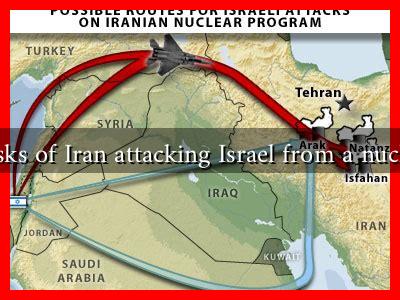-
Table of Contents
- What are the Risks of Iran Attacking Israel from a Nuclear Standpoint?
- The Nuclear Landscape: Iran’s Capabilities
- The Risks of a Nuclear Attack on Israel
- 1. Immediate Humanitarian Catastrophe
- 2. Regional Destabilization
- 3. Global Security Implications
- Case Studies: Historical Precedents
- Conclusion: The Need for Diplomatic Solutions
What are the Risks of Iran Attacking Israel from a Nuclear Standpoint?
The geopolitical landscape of the Middle East is fraught with tension, particularly between Iran and Israel. As Iran continues to develop its nuclear capabilities, the potential for a nuclear confrontation raises significant concerns.
. This article explores the risks associated with a hypothetical Iranian nuclear attack on Israel, examining the implications for regional stability, international relations, and global security.
The Nuclear Landscape: Iran’s Capabilities
Iran’s nuclear program has been a subject of international scrutiny for decades. Despite the Joint Comprehensive Plan of Action (JCPOA) established in 2015, which aimed to limit Iran’s nuclear activities in exchange for sanctions relief, tensions have escalated since the United States withdrew from the agreement in 2018. Iran has since resumed enriching uranium, raising alarms about its potential to develop nuclear weapons.
- Uranium Enrichment: Iran has increased its uranium enrichment levels, surpassing the limits set by the JCPOA.
- Ballistic Missile Development: Iran has invested heavily in ballistic missile technology, which could potentially deliver nuclear warheads.
- Regional Alliances: Iran’s partnerships with groups like Hezbollah and Hamas could facilitate proxy attacks against Israel.
The Risks of a Nuclear Attack on Israel
The prospect of Iran launching a nuclear attack on Israel poses several risks, both immediate and long-term. Understanding these risks is crucial for policymakers and the international community.
1. Immediate Humanitarian Catastrophe
A nuclear strike on Israel would result in catastrophic loss of life and widespread destruction. The immediate effects would include:
- Mass casualties: A nuclear explosion could kill hundreds of thousands instantly.
- Long-term health effects: Survivors would face radiation exposure, leading to increased cancer rates and other health issues.
- Infrastructure devastation: Key infrastructure, including hospitals, schools, and transportation networks, would be obliterated.
2. Regional Destabilization
The repercussions of a nuclear attack would extend beyond Israel, destabilizing the entire Middle East. Potential outcomes include:
- Escalation of conflict: Neighboring countries may retaliate, leading to a broader regional war.
- Refugee crises: Millions could be displaced, creating humanitarian emergencies in surrounding nations.
- Empowerment of extremist groups: A nuclear attack could embolden militant organizations, further complicating peace efforts.
3. Global Security Implications
The use of nuclear weapons in the Middle East would have far-reaching consequences for global security. Key concerns include:
- Proliferation: Other nations may pursue nuclear capabilities in response, leading to a new arms race.
- International relations: The attack could strain diplomatic ties and complicate negotiations on nuclear disarmament.
- Economic repercussions: Global markets could suffer from instability, affecting oil prices and international trade.
Case Studies: Historical Precedents
Examining historical precedents can provide insight into the potential consequences of a nuclear attack. For instance:
- Hiroshima and Nagasaki: The bombings in 1945 resulted in immediate and long-term devastation, influencing global nuclear policy.
- India-Pakistan Tensions: The nuclear capabilities of both nations have led to several close calls, highlighting the risks of miscalculation.
Conclusion: The Need for Diplomatic Solutions
The risks associated with a potential Iranian nuclear attack on Israel are profound and multifaceted. From immediate humanitarian crises to long-term global security challenges, the implications are dire. As tensions continue to rise, it is imperative for the international community to engage in diplomatic efforts to prevent escalation and promote stability in the region.
In summary, the threat of nuclear conflict in the Middle East underscores the importance of dialogue, cooperation, and proactive measures to ensure that history does not repeat itself. The stakes are too high for complacency; proactive engagement is essential to avert a catastrophic scenario.
For further reading on the implications of nuclear proliferation, visit Arms Control Association.





